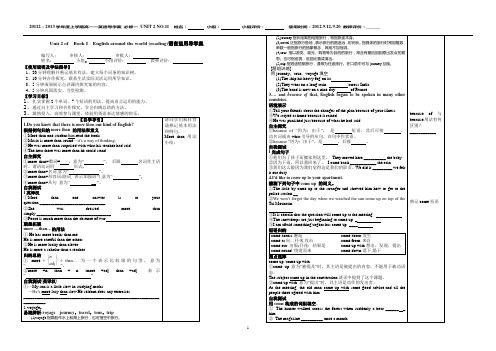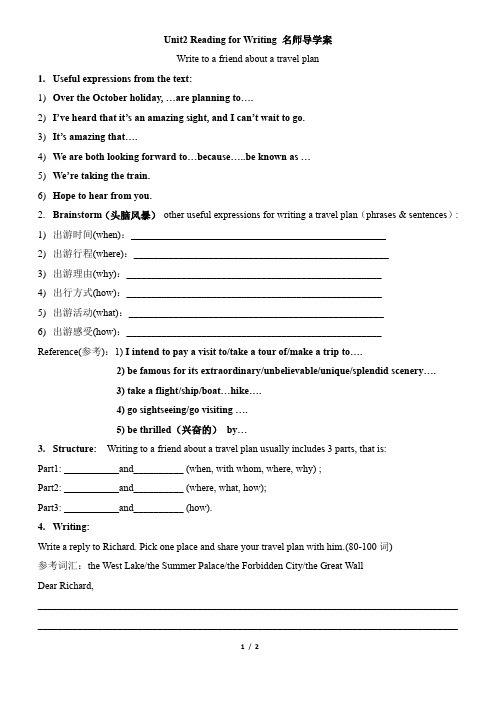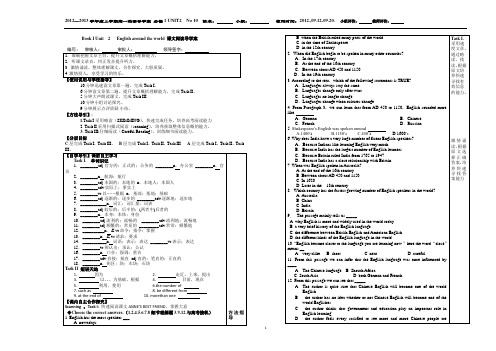人教版必修一Unit2导学案
2023年人教版高中英语必修二导学案全套

2023年人教版高中英语必修二导学案全
套
目标
本文档旨在提供2023年人教版高中英语必修二导学案全套,
以帮助学生有效地研究并掌握相关知识。
导学案一:Unit 1-Module 1
- 研究目标:理解并正确运用文中介绍家庭成员关系的单词和
短语;能够使用一般现在时、一般过去时以及一般将来时进行句子
构建。
- 活动建议:请学生们观看与家庭成员关系相关的视频,进行
小组讨论并分享个人观点。
导学案二:Unit 1-Module 2
- 研究目标:能够正确使用表示主观感受和客观事实的形容词;能够运用情态动词来表达能力、可能性和建议。
- 活动建议:请学生们进行角色扮演,模拟真实生活场景并运
用所学知识进行表达。
导学案三:Unit 2-Module 1
- 研究目标:理解并正确运用关于动作和状态的词汇和短语;能够使用现在进行时和一般现在时来进行句子构建。
- 活动建议:请学生们进行小组合作,完成一份关于自己日常活动的时间表,并用英语进行展示。
......
导学案N:Unit N-Module N
- 研究目标:【填写具体的研究目标】
- 活动建议:【填写具体的活动建议】
总结
通过本套导学案的研究,学生们将全面掌握2023年人教版高中英语必修二的相关知识。
建议学生们积极参与导学案提供的各类活动,巩固所学内容,并及时向教师寻求辅导和解答疑惑。
高一上人教版英语必修1学案Unit2 English around the world学案语言运用导学案2

Unit 2 of Book I English around the world (learning about language and Using language)语言运用导学案编写人:审核人:审批人:【使用说明及学法指导】1、20分钟理解并熟记基本有法,建立每个词条的知识树。
2、10分钟合作探究,联系生活实际灵活运用所学知识。
3、5分钟成果展示点评课内探究案的内容。
4、5分钟巩固落实、当堂检测。
【学习目标】1、扎实掌握3个单词、1个短语和2个句型的用法,提高语言运用的能力。
2、通过自主学习和合作探究,学会归纳总结的方法。
3、激情投入,高效参与课堂,体验用英语表达情感的快乐。
【自学导引】课前自主学习Ⅰ.单词识记Ⅰ.单词预知1.v. 命令;掌握;请求,要求;辨认出;承认;公认2.n. 使用,用法;方言;词语;表达;卡车;口音;闪电;街区;木块;出租车3. adj. 中西部的;东方的;东南方的;西北方的;直的Ⅱ.短语天地1.官方语言2.作航海旅行3.与……交流4.利用5.许多6.……的数量7. make sense ___________8. As we know ____________9.扮演一个角色;参与Ⅲ.句型搜索:经典句式1.in the early days of radio,those whoreported the news were expected to speak excellent English.(this)这是因为在早期的收音机时代,对新闻播音员的要求是讲一口极好的英语。
2.However,on TV and the radio you will heardifferences .(way)但是,从电视上和收音机上,你会听到不同的人有着不同的说话方式。
3.So people from the mountains in the southeastern USAspeak with almost dialect people in the northwesternUSA.(as)所以来自美国东南部山区的人和来自美国西北部的人说着同样的地方方言。
高一上人教版英语必修1学案Unit2 English around the world学案语言运用导学案

Unit 2 of Book I English around the world (reading)语言运用导学案编写人: 审核人: 审批人:姓名: 小组: 小组评价: 教师评价: 【使用说明及学法指导】1、20分钟理解并熟记基本有法,建立每个词条的知识树。
2、10分钟合作探究,联系生活实际灵活运用所学知识。
3、5分钟成果展示点评课内探究案的内容。
4、5分钟巩固落实、当堂检测。
【学习目标】1、扎实掌握2个单词、7个短语的用法,提高语言运用的能力。
2、通过自主学习和合作探究,学会归纳总结的方法。
3、激情投入,高效参与课堂,体验用英语表达情感的快乐。
【自学导引】 1.Do you know that there is more than one kind of English? 根据例句归纳more than 的用法和意义 ①More than one student has read the book. ②Music is more than sound —it’s a way of thinking.③He was more than surprised with what his teacher had said.④The heat there was more than he could stand.自主探究①more than+数词= ,意为“ ”, 后跟 名词作主语时,谓语动词用 形式。
②more than+名词,意为“ ”。
③more than+形容词/副词, 表示加强语气,意为“ ”。 ④more than+从句 意为“ __ ”。
自我测试 I 英译汉①More than one answer is to yourquestion.______________________________②She was dressed more than simply.__________________________________③Peace is much more than the absence of war. 联想拓展 more …than…的用法 ① He has more books than me. He is more careful than the others.②He is more lucky than clever.He is more a scholar than a teacher.归纳总结 ① more +⎩⎨⎧⎭⎬⎫n .adj .+than… 为一个表示比较级的句型,意为“ ”。
人教必修一Unit2Reading for Writing 名师导学案3

Unit2 Reading for Writing 名师导学案Write to a friend about a travel planeful expressions from the text:1)Over the October holiday, …are planning to….2)I’ve heard that it’s an amazing sight, and I can’t wait to go.3)It’s amazing that….4)We are both looking forward to…because…..be known as …5)We’re taking the train.6)Hope to hear from you.2.Brainstorm(头脑风暴)other useful expressions for writing a travel plan(phrases & sentences):1)出游时间(when):___________________________________________________2)出游行程(where):___________________________________________________3)出游理由(why):___________________________________________________4)出行方式(how):___________________________________________________5)出游活动(what):___________________________________________________6)出游感受(how):___________________________________________________Reference(参考):1) I intend to pay a visit to/take a tour of/make a trip to….2) be famous for its extraordinary/unbelievable/unique/splendid scenery….3) take a flight/ship/boat…hike….4) go sightseeing/go visiting ….5) be thrilled(兴奋的)by…3.Structure: Writing to a friend about a travel plan usually includes 3 parts, that is:Part1: ___________and__________ (when, with whom, where, why) ;Part2: ___________and__________ (where, what, how);Part3: ___________and__________ (how).4.Writing:Write a reply to Richard. Pick one place and share your travel plan with him.(80-100词)参考词汇:the West Lake/the Summer Palace/the Forbidden City/the Great WallDear Richard,____________________________________________________________________________________ ________________________________________________________________________________________________________________________________________________________________________ ____________________________________________________________________________________ ____________________________________________________________________________________ ____________________________________________________________________________________ ____________________________________________________________________________________ ____________________________________________________________________________________ ____________________________________________________________________________________ ____________________________________________________________________________________ ____________________________________________________________________________________ ____________________________________________________________________________________Yours,Xiao Li。
高一上人教版英语必修1学案Unit2 English around the world学案阅读导学案

9.________n.本身;本体;身份
10.________adj.流利的;流畅的________adv.流利地;流畅地
11.________adj.频繁的;常见的_________adv.常常;频繁地
12.__________n.& vt.命令;指令;掌握
A.Because Indians like learning English very much.
B.Because India has the largest number of English learners.
C.Because Britain ruled India from 1765 to 1947.
13.________n.& vt.请求;要求
14.___________n.词语;表示;表达________vt.表示;表达
15.________vt.辨认出;承认;公认
16.________n.口音;强调;重音
17.________adv.直接;挺直adj.直的;笔直的;正直的
18.________n.街区;块;木块;石块
◆Choose the correct answers.(1.2.4.5.6.7.8细节理解题3.9-12与高考接轨)
1.English has the most speakers ___.
A. nowadays
B. when the British ruled many parts of the world
C. In 1620.
D. Later in the 18th century.
8.Which country has the fastest growing number of English speakers in the world?
人教版必修一unit2基础知识课前导学案(带答案)

Unit 2 English around the world Section ⅠWarming Up,Pre-reading,Reading & Comprehending一、词汇新知1.通过查阅词典,写出下列单词的派生词(1)official adj. 官方的;正式的;公务的n.官员;公务员;高级职员→_________ n.办公室→_________ n.军官,警官;公务员(2)gradual adj.逐渐的;逐步的→_________adv. 逐渐地;逐步地(3)spell vt.拼写→_________n. 拼写;拼法(4)frequent adj. 频繁的;常见的→_________ adv.常常;频繁地2.选择合适的词并用其适当形式填空latter native fluent actual base(1)—What’s your opinion?—_________ there’s no need to hold a meeting.(2)As a matter of fact,French is not Jack’s_________language.(3)Of the two,the _________is more useful.(4)—Can the girl make herself understood in London?—Yes.She can speak English _________.(5)—The new book by Mo Yan is loved by readers.—That’s because he _________this book on his life.二、核心短语1._________因为;由于2._________走近;提出;上来3.at present_________4.make use of_________三、经典句式1._________go by Underground?为什么不乘地铁去?2.Today,more people speak English as their first,second or a foreign language_________.如今说英语的人比以往任何时候都多了,他们有的是作为第一语言来说,有的是作为第二语言或外语。
高一英语人教版必修一导学案Unit 2 English around the world Period Ⅱ Reading Comprehension含答案
Period ⅡReading ComprehensionⅠ.单词巩固1.v. ________征服,占领________以……为根据________使富裕n.________电梯________汽油________汽油,气体________航行________公寓________词汇,词汇表________拼写________本身,身份2.adj./ad v. ________官方的________本国的________实际上________逐渐的________逐渐地________较后的________流利的________流利地________频繁的________常常Ⅱ.短语回顾1.________________由于,因为2.________________走近,上来3.________________目前4.________________利用5.________________例如Ⅰ.阅读课文,判断正误1.Nearly all of the English-speaking people lived in England at the end of 16th century.()2.In the 17th century,people in many other countries began to speak English as their first,second or a foreign language.()3.Native English speakers usually don’t speak the same kind of English,but they can sometimes understand each other.()4.English spoken in England between about AD 540 and 1150 was different from the English spoken today.()5.At first English was based more on German while the English spoken today is based on Danish and French.()6.The English language wasn’t settled until the 19th century.()7.Noah Webster wrote a dictionary,giving a separate identity to American English spelling.()8.Today English is widely spoken in the world except in South Africa.()Ⅱ.阅读课文,给每段选择正确大意1.Paragraph 1 ()A.Why has English changed over time?2.Paragraph 2 () B.Native English speakers can understand each other even if they don’t speak the same kind of English.3.Paragraph 3 () C.English is now spoken as a foreign or second language in South Asia.4.Paragraph 4 () D.Finally by the 19th century the language was settled.5.Paragraph 5 () E.Many people all over the world speak English.Ⅲ.阅读课文,完成下列表格1.Where did most of the English speakers live at the end of the 16th century?A.America. B.England.C.South Asia. D.South Africa.2.When did English begin to be spoken in many other countries?A.In the 17th century.B.At the end of the 16th century.C.Between about AD 450 and 1150.D.In the 19th century.3.According to the text,which of the following statements is TRUE?A.Languages always stay the same.B.Languages change only after wars.C.Languages no longer change.D.Languages change when cultures change.4.From Paragraph 3,we can learn that from AD 450 to 1150,English sounded more like ______.A.German B.Chinese C.French D.Russian5.Why does India have a very large number of fluent English speakers?A.Because Indians like learning English very much.B.Because India has the largest number of English learners.C.Because Britain ruled India from 1765 to 1947.D.Because India has a close relationship with Britain.Ⅴ.SummaryAs you know,English has changed over time.Why?1.________ all languages change and develop when cultures meet and 2.________ with each other.At first,English was 3.________ more on German than the English we speak 4.____________.Then 5.________ new settlers came and enriched the English language and especially its 6.________.So by the 1600’s Shakespeare was able to 7.____________ a wider vocabulary than ever before.In 1620 some British settlers moved to ter in the 18th century some British people were taken to Australia too.English began to be spoken in both countries.Finally by the 19th century the language was settled.At that time two big changes in English 8.________ happened:first Samuel Johnson wrote his dictionary and later Noah Webster wrote The American Dictionary of the English Language.The 9.________ gave a separate 10.________ to American English spelling.Period ⅡReading Comprehension 课前准备区Ⅰ.1.conquer;base;enrich;elevator;petrol;gas;voyage;apartment;vocabulary;spelling;identity2.official;native;actually;gradual;gradually;latter;fluent;fluently;frequent;frequently Ⅱ.1.because of e up 3.at present4.make use of 5.such as课堂活动区Ⅰ.1.T 2.F 3.F 4.F 5.F 6.T7.T8.FⅡ.1.E 2.B 3.A 4.D 5.CⅢ.1.German 2.ruled 3.less 4.enriched 5.1600’s6.made use ernment10.19th11.dictionary 12.foreignⅣ.1.B 2.A 3.D 4.A 5.CⅤ.1.Actually municate3.based 4.at present 5.gradually6.vocabulary7.make use tter10.identity。
人教版必修一Unit2Englisharoundtheworld导学案.doc
Unit 2 English around the world第一课时:Warming-up & vocabulary 预习导学:一、语言要点单元要点预览本单元重点小练:1.单词识记:adj.官方的;公务的VL征服;占领adv.实际上;事实上n.词汇;词表n.本身;身份adj.频繁的;常见的n.词语;表达adv. & adj.直接;直的n.航行,航海adj.本国的;本地的adv.逐渐地;逐步地n.拼写;拼法adv.流利地;流畅地n. & vt.命令;掌握n.口音;腔调;重音n..街区;木块2.重点句式:1.Today,people speak English as their first, second or a foreign language everbefore.如今说英语的人比以往任何时候都多了,他们有的是作为第一语言来说,有的是作为第二语言或外语。
2.Native English speakers can understand each other they don't speak the same kind of English.以英语作为母语的人,即使他们所讲的语言不尽相同,也可以相互理解。
3.Actually all languages change and develop when cultures meet and each other.事实上,当不同文化互相交流渗透时,所有的语言都会有所变化、有所发展的。
4.It was more German than the English we speak at present.当时的英语更多地是以德语为基础,而我们今天所说的英语不是。
5.,there is as standard English.信不信由你,(世界上)没有什么标准英语。
知识详解1.voyage/journey/travel/trip/tour(回归课本P9) Later in the next century, people from England made voyages to conquer other parts of the world and because of that» English began to be spoken in many other countries.[易混辨析]voyage:去国外或较远地方的海上旅行journey:指较远的从一地到另一地旅行travel: 一系列的旅程,尤指旅行的概念trip:(短途)旅行tour:为了公务、娱乐或教育参观多处名胜的旅行[即境活用]用上面所提供的辨析词的适当形式填空1). It is tiring to take a long by train from Paris to Moscow.2). The from England to Australia used to take several months.3). We'll have time for a to France next weekend.4). We went on a guided round the castle.[归纳拓展]make/ take a voyage 进行航行be on a voyage to... 正往...航行go on a voyage 去航行2. because of 因为..... 由于.... 的缘故[易混辨析]because of, owing to, due to, thanks to 这四个短语都有“由于","因为”的意思,都是介词短语,因此后面不可接从句。
人教版高中英语导学案必修一Unit 2 English around the World pdf版
Unit2English around the World连词成篇Different Countries Have Different Kinds of EnglishesVoyage s of people from England play an important part in spread ing the English language.At present, English is frequently spoken as an official or common language in many countries,such as America,Singapore, Malaysia and some African countries.All base d on British English,the English spoken in these countries can be well understood by native English speakers.But actually,these Englishes have been gradually changing in accent s, spelling s,expression s and the usage of vocabulary.Because of this fact,you can make use of the differences to tell which country the foreigners of your block are from.For example,if a boss fluently commands his driver,“Come up straight to my apartment by elevator and take some gas for my trucks and cab s”,instead of request ing,“Please come to my flat by lift and take some petrol for my lorries and taxis”,you can recognize his American identity,while the latter suggest s that he is British.词汇详解1.voyage['vɔɪɪdʒ]n.&vi._______________记:我一直热爱航海。
高一上人教版英语必修1学案Unit2 English around the world学案单元基础知识检测导学案
20112~2013学年度上学期高一一英语导学案必修一UNIT 2 NO.15 姓名:小组:小组评价:使用时间:2012.9.5-9.20 教师评价:______Unit2 English around the world 单元基础知识检测导学案编写人:审核人:审批人:使用时间:学习目标1 熟记本单元基础知识,提升活用能力。
2 疯狂背诵、大胆质疑,总结基本用法。
3劳有所获;激情投入,享受学习的快乐。
使用说明:同学们一定要熟练掌握本单元词汇、短语及句型的用法,限时训练,活学活用。
15分钟自测。
10分钟互评。
10分钟疯狂背诵巩固。
5分钟互查活用。
分层达标:C层完成单词、短语。
B层A层完成单词、短语及句子.I Words:20112~2013学年度上学期高一一英语导学案必修一UNIT 2 NO.15 姓名:小组:小组评价:使用时间:2012.9.5-9.20 教师评价:______II Phrases:1.不止一种英语____________________ 2.与。
不同____________________ 3.在一些重要方面___________________________ 4.在…末_____________________ 5.因为______________________ 6.提出____________________ 7.随着时间的推移__________________________ 8.以。
为基础________________ 9.出席,到场________________________ 10.目前__________________ 11.利用_______________ 12.充分利用________________ 13.英语口语_________________________ 14.大量的_____________________ 15.有意义,有道理______________ 16.在海边______________________ 17.不假思索____________________________ 18.众所周知__________________ 19.坚持,稍后,别挂断_________ 20.在。
- 1、下载文档前请自行甄别文档内容的完整性,平台不提供额外的编辑、内容补充、找答案等附加服务。
- 2、"仅部分预览"的文档,不可在线预览部分如存在完整性等问题,可反馈申请退款(可完整预览的文档不适用该条件!)。
- 3、如文档侵犯您的权益,请联系客服反馈,我们会尽快为您处理(人工客服工作时间:9:00-18:30)。
Para 1.____________________________________________________________________________________
【知识链接】New words and expressions
【学法指导】Learn by themselves , discussion and showing.
【学习流程】
I.Review the key points and phrases
II.Reading
StepI.Lead in
Ask students several questions in the form of brainstorming.
III. Homework preview the key points on page21-24(长江作业)
1.Which country speak English as their native language?
2.Which country speak English as their second foreign language?
StepII. Fast reading
1)Look at the title of the passage and try to guesБайду номын сангаас what it is about .Then skim the reading passage and find the main idea of the text to see if you are right.
。During the 5thcentury AD: English was based more on German.
。Between about AD 800 and 1150:__________________________________________________________
_________________________________________________________________________________________
Para 4.____________________________________________________________________________________
Para 5.____________________________________________________________________________________
StepV.Post-reading
1.Do you think it matters what kind of English you learn, why?
2.Why do you think people all over the world want to learn English?
3.Will Chinese English become one of the World English?
。From the 18thcentury: _____________________________________________________________________
。1765-1947:______________________________________________________________________________
6.This reading describes the development of the English language.
Make a timeline of the development of English.(first find the clue---time, then the event)
【学习目标】1..能力目标:Learn about the difference between American English and British English.
2.语言目标:Learn about the history of the English language
【重点难点预测】Find the main idea according to the topic sentences.
。By 19thcentury:__________________________________________________________________________
StepIV. Fill in the blanks ( try to retell)
About____ _million peoplespeak English at the end of 16th century. Nearly all of them lived in _______. In the 17th century, people fromEnglandmade _______ to _______ other country,so English began to be spoken in many other countries. ______ English speakers can understand each other _______theydon'tspeak the same kind of English. Why English has change ___ time? All languages change when ______ meet and communicate with each other. The English spoken between about AD 450 and 1150 was very different from __ __. Actually, it was ___ __more on__ ____than English at present.
From about AD 800to 1150, English became less like _______ because the rulers spoke first ______ and later ______. In the1600’s, Shakespeare made _____ of a wider_________ than before. In 1620,some British settlers moved to _______. Later in the 18th century, British people went to ________.English is also spoken as a foreign or second language inSouth Africa.Indiahas a very large number of English _______. This is becauseBritainruled ______ from 1765 to 1947. During that time English became language for __________ and ________. English is also spoken inChina. Today ______ may have the largest number of English learners.
。By the 1600s:____________________________________________________________________________
。1620: __________________________________________________________________________________
nguage frequently change.
4.The language of the government is always the language of the country.
5.English is one of the official languages used in India.
Step III. Careful Reading:
True or False
1.English he had the most speakers in the 17t century.
2.English developed when new settlers and rulers came to Britain.
Para 2.____________________________________________________________________________________
Para 3.____________________________________________________________________________________
